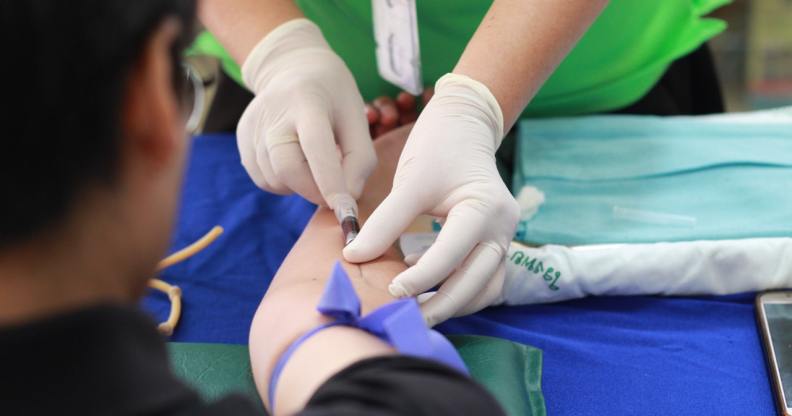Blood donation service says coronavirus isn’t a good enough reason to relax ‘unscientific’ rules for gay and bi men

(Pexels)
Ireland’s blood donation service has said that the coronavirus pandemic “would not be a reason to review” its 12-month deferral policy for gay and bisexual men.
During the AIDS-epidemic of the 1980s, various countries around the world banned gay and bisexual men from donating blood for life.
Many countries have since replaced their lifetime bans with deferral policies, whereby gay and bisexual men must practice celibacy for a certain period of time before being allowed to donate blood.
The Republic of Ireland lifted its lifetime ban on gay and bisexual men in 2017 and replaced it with a 12-month deferral period. This means men who have sex with men must abstain from sex for 12 months before giving blood.
The United States recently dropped its 12-month deferral period to three months due to the ongoing pandemic, and Australia is planning a similar move. The changes are designed to help meet blood-transfusion demands, as the supply has been badly hit in some countries.
The Irish blood donation service said the coronavirus pandemic has not caused any shortages.
However, in a statement released today (April 20) to PinkNews, the Irish Blood Transfusion Service (IBTS) said it is not experiencing any shortage of blood – and said the coronavirus pandemic would not be a valid reason to review its policy.
A spokesperson for the IBTS said the 12-month deferral policy for gay and bisexual men will only be reviewed “when the IBTS believes that there is a policy imperative and an evidence base for such a review.”
The pandemic of itself would not be a good reason to review this deferral.
The spokesperson continued: “As regards the COVID-19 pandemic the blood supply is currently very good. In fact we have had to cancel some donation clinics because of the good supply.
“The pandemic of itself would not be a good reason to review this deferral.”
An Irish blood donation activist, who asked to remain anonymous, questioned the reasoning presented by the IBTS.
“The comment obviously seems to infer that there currently isn’t any evidential or scientific basis for review of the policy, whereas in fact the opposite is the case in that there currently is no evidential or scientific basis to the policy as it stands,” the activist told PinkNews.
The Irish blood service’s commitment to its 12-month deferral policy puts it at odds with other countries. In 2017, the UK dropped its deferral period to three months instead of 12.
500 experts in the United States have urged the FDA to scrap its deferral period completely.
Earlier this month, the United States food and drug administration (FDA) announced that it was dropping its 12-month deferral policy to three in response to blood shortages caused by COVID-19.
Last week, more than 500 HIV and infectious disease experts wrote an open letter to the FDA urging them to scrap its deferral policy completely.
In the letter, the experts insist that improvements to testing mean that the chances of a person with HIV successfully donating blood are slim.
“Banning men from blood donation for at least a year since their most recent sexual encounter with a man is unscientific and based on outdated antibody-based HIV testing algorithms,” the letter said.
They said that gay and bisexual men who are in monogamous relationships as well as those using pre-exposure prophylaxis (PrEP) have “a particularly low risk of HIV acquisition.”
Despite this, the Irish Blood Transfusion Service (IBTS) looks set to retain its 12-month deferral period for the foreseeable future.

